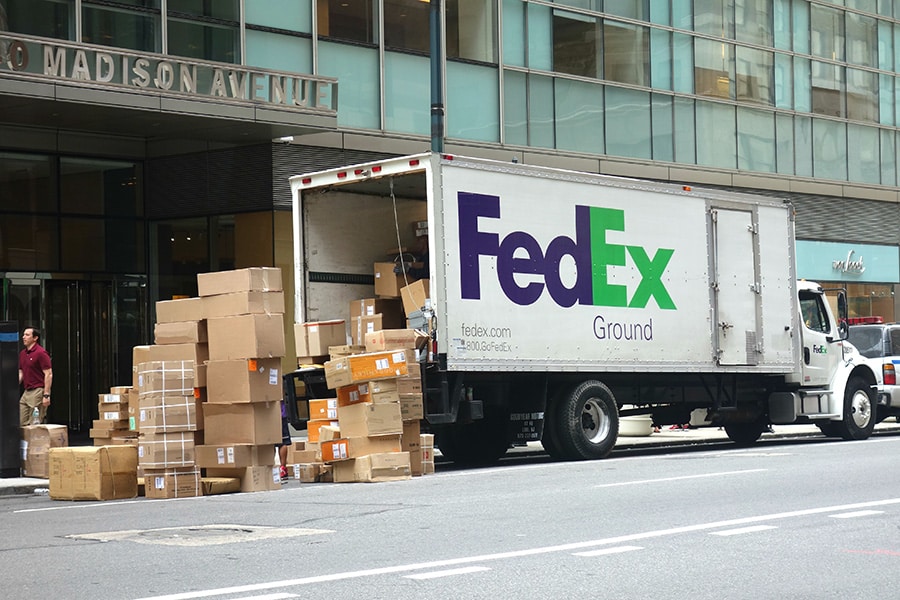Drive through any Birmingham suburb on a weekday afternoon and count the delivery trucks. Amazon vans racing between stops. FedEx trucks double-parked on narrow streets. UPS drivers rushing to meet impossible quotas. Since 2020, delivery vehicles in Alabama neighborhoods have tripled, and so have the accidents they cause. When one of these trucks hits you, you’re not just facing a driver – you’re facing a corporate giant with armies of lawyers ready to protect their bottom line.
The Explosion of Delivery Trucks on Alabama Roads
The numbers are staggering. Amazon alone has over 100,000 delivery vehicles nationwide, with hundreds operating daily in Birmingham, Montgomery, and Huntsville. Add FedEx, UPS, and other carriers, and Alabama roads see thousands of delivery trucks every day. These aren’t professional truckers with CDL licenses – many are regular people hired quickly to meet exploding demand.
Michael Strickland, founding attorney at Strickland Law Group with over 30 years fighting corporate defendants, sees the consequences daily. “These companies prioritize speed over safety,” he explains. “Drivers face unrealistic delivery quotas that force them to speed, skip breaks, and take dangerous shortcuts through residential areas. When accidents happen, the companies claim they’re not responsible because the drivers are ‘independent contractors.’ We know how to prove otherwise.”
The pressure on drivers is intense. Amazon’s AI system tracks every second, penalizing drivers for any delays. UPS’s ORION system demands impossible routes. FedEx Ground contractors push drivers to deliver more packages in less time. This pressure creates dangerous conditions on every street in Alabama.
Understanding the Complex Web of Delivery Truck Liability
When a delivery truck hits you, determining who’s responsible isn’t simple. These companies have intentionally created complex structures to avoid liability, but experienced lawyers know how to untangle the web and hold them accountable.
The Amazon DSP Shell Game
Amazon doesn’t technically employ most of its delivery drivers. Instead, they use Delivery Service Partners (DSPs) – small companies that Amazon controls but claims are independent. When an Amazon van hits you, Amazon says “sue the DSP, not us.” But here’s the reality: Amazon controls everything about these operations.
Amazon mandates the vans DSPs must use (with Amazon logos), sets delivery routes and timeframes, monitors drivers through AI surveillance, requires specific insurance policies, and can terminate DSPs instantly for not meeting metrics. Despite this control, Amazon tries to hide behind the DSP structure when accidents happen.
Michael Strickland, partner at Strickland Law Group, has pierced this veil before: “Amazon wants all the benefit of controlling deliveries without any responsibility for accidents. We’ve successfully shown that Amazon’s control makes them liable, regardless of their DSP games. Their own training materials and contracts prove they’re calling the shots.”
FedEx Ground’s Contractor Confusion
FedEx Ground operates similarly, using “independent” contractors who own routes. But FedEx still controls vehicle appearance and standards, delivery requirements and timeframes, customer service protocols, and performance metrics. When their contractor’s driver hits you, FedEx claims no responsibility. But their level of control often creates liability despite the contractor relationship.
UPS: Employees vs. Seasonal Workers
UPS primarily uses actual employees, which should make liability clearer. But they increasingly rely on seasonal and temporary workers during peak periods. These less-experienced drivers, working during the busiest times, create additional dangers. UPS tries to provide minimal training then claim drivers violated policies when accidents happen.
Why These Cases Require Immediate Action
The moment a delivery truck accident happens, corporate response teams spring into action. These companies have protocols designed to minimize their liability and your compensation.
The Corporate Investigation Machine
Within hours of your accident, these companies deploy investigators to the scene, interview their driver (and coach their story), secure surveillance footage from nearby cameras, download vehicle data before it’s overwritten, and contact witnesses before you can. They’re building their defense while you’re still getting medical treatment.
Their insurance adjusters will call you quickly, seeming helpful and concerned. They’re actually gathering information to use against you. They’ll ask for recorded statements, request broad medical authorizations, and offer quick settlements before you know your injuries’ extent. Every word you say becomes ammunition to reduce or deny your claim.
Evidence That Disappears
Delivery companies control crucial evidence that vanishes quickly. Vehicle tracking data showing speed and location gets overwritten within days. Delivery route information proving unrealistic schedules disappears. Driver logs showing hours without breaks get deleted. Internal communications about safety problems get destroyed.
Without immediate legal action to preserve this evidence, your case weakens dramatically. Strickland Law Group knows exactly what evidence to demand and how to preserve it before corporate defendants make it disappear.
Common Causes of Delivery Truck Accidents in Alabama
Understanding why these accidents happen helps prove corporate responsibility. The patterns are clear across Birmingham, Montgomery, and Huntsville neighborhoods.
Unrealistic Delivery Quotas
Drivers face impossible math: deliver 200+ packages in 8 hours. That’s less than 2.5 minutes per stop, including driving time. To meet these quotas, drivers speed through residential areas, run stop signs and red lights, park illegally and block traffic, and make dangerous U-turns and backing maneuvers.
When accidents result, companies blame drivers for “violating safety policies” while ignoring that their quotas make safety impossible.
Inadequate Training for Complex Vehicles
Many delivery drivers have never operated large commercial vehicles before. Companies provide minimal training – sometimes just a few days – before putting drivers on the road in vehicles that have massive blind spots, require longer stopping distances, handle differently when loaded, and need special skills for backing and turning.
Distracted Driving and Technology
Drivers juggle multiple devices while driving – navigation systems, delivery apps, and customer communication tools. Amazon’s app requires constant interaction. UPS’s DIAD device demands attention. FedEx scanners need updates at every stop. This technology, meant to increase efficiency, creates dangerous distraction.
Fatigue and Overwork
During peak seasons, drivers work 12+ hour days, six or seven days a week. Fatigue-related accidents spike during holiday seasons when delivery demands are highest. Companies know exhausted drivers are dangerous but prioritize profits over safety.
Building Your Case Against Delivery Giants
These companies have resources, but Strickland Law Group knows how to level the playing field. With over $1 billion recovered and more than 100 trials, they have the experience and resources to take on corporate defendants.
Securing Critical Evidence
The first step is sending litigation hold letters demanding preservation of all evidence. This includes vehicle data, driver records, route information, communications, surveillance footage, and training materials. Companies that destroy evidence after receiving these letters face serious consequences.
Proving Corporate Control
Despite contractor arrangements, proving the company’s control establishes liability. This requires analyzing contracts between companies and contractors/DSPs, operational requirements and standards, training materials and procedures, disciplinary policies and termination rights, and technology systems that monitor and control drivers.
Demonstrating Systematic Problems
One accident might be a driver’s fault. Patterns of accidents prove corporate negligence. Strickland Law Group investigates similar accidents involving the same company, safety complaints from drivers and customers, violation histories with DOT and other agencies, and internal documents showing known dangers.
Frequently Asked Questions About Delivery Truck Accidents
Who do I sue – Amazon or the DSP? Both, potentially. While Amazon tries to hide behind DSPs, their control often creates liability. Experienced lawyers sue all potentially responsible parties and let the court sort out liability. This prevents finger-pointing that delays compensation.
What if the delivery driver was clearly at fault? Driver fault doesn’t end the analysis. The question becomes why the driver was negligent. Unrealistic quotas, inadequate training, or failed supervision create corporate liability even when drivers make mistakes.
How are delivery truck cases different from regular car accidents? These cases involve corporate defendants with vast resources, complex liability structures, evidence controlled by defendants, and federal regulations for commercial vehicles. They require lawyers experienced in fighting corporate legal teams.
What compensation can I receive? Beyond typical damages like medical bills and lost wages, corporate negligence can justify punitive damages. These companies’ deep pockets mean higher insurance policies and potential for larger settlements, but only if you have lawyers who won’t accept inadequate offers.
How long do these cases take? Corporate defendants often drag out cases hoping you’ll accept less. Strickland Law Group’s trial reputation speeds up settlements because companies know they’ll go to court if necessary. Most cases resolve within 12-18 months, though some require trial.
What if I already gave a statement to their insurance? While not ideal, experienced lawyers can often overcome early statements. Stop all communication immediately and let your lawyers handle everything going forward. They know how to minimize damage from initial statements.
Don’t Face Corporate Giants Alone
When Amazon, FedEx, or UPS trucks cause accidents, their corporate machines immediately work to minimize liability. You need equally powerful advocates on your side. These companies count on victims being intimidated by their resources and accepting whatever crumbs they offer.
Michael Strickland have spent decades standing up to corporate bullies. They have the resources to match corporate legal teams, the experience to navigate complex liability structures, and the courage to take cases to trial when companies won’t pay fair compensation.
If you’ve been hit by an Amazon, FedEx, UPS, or any delivery truck in Alabama, you’re facing a corporate giant that puts profits over people. Call Strickland Law Group at 334-269-3230 for a free consultation. They’ll immediately preserve evidence, investigate corporate responsibility, and fight for maximum compensation. Don’t let delivery companies treat your injuries as just another cost of doing business. Get lawyers who make them pay attention and pay what they owe.
Legal Disclaimer: This blog post is for informational purposes only and does not constitute legal advice. While efforts have been made to ensure accuracy regarding delivery company structures and liability issues as of 2025, corporate arrangements and contractor relationships change frequently. Statistics about delivery vehicles and accident rates are approximations based on available data. The descriptions of Amazon DSP programs, FedEx Ground contractor arrangements, and UPS employment structures are based on publicly available information and may not reflect all operational variations. Information about Strickland Law Group, including attorney experience, case results, and contact information, should be verified directly with the firm. Past results do not guarantee future outcomes. Each delivery truck accident case is unique based on specific facts, corporate structures, and applicable contracts. Federal and state regulations affecting commercial vehicles are complex and subject to change. For legal advice regarding your specific accident involving a delivery vehicle, consult with a qualified Alabama personal injury attorney immediately. Evidence preservation is time-sensitive. No attorney-client relationship is created through reading this blog. Time limits apply to filing claims – seek legal consultation promptly to protect your rights.

